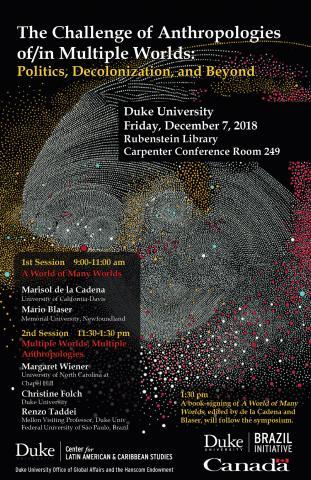
Symposium to Address How to Solve Global Problems while Embracing Differences

Whether dealing with climate crisis, inequality, political tensions, or other global problems, seeking solutions frequently requires partnerships between people who may inhabit the world very differently. Yet standard ways of working cross-culturally often do not fully accept or take sufficient advantage of different world views, said Renzo Taddei, Mellon Visiting Professor of Latin American and Caribbean Studies at Duke University and chief convener of The Challenge of Anthropologies of/in Multiple Worlds: Politics, Decolonization, and Beyond, a symposium that takes place Friday, Dec. 7 in the Rubenstein Library Carpenter Conference Room (249) on Duke's West Campus.
Focusing on the role of indigenous peoples in endeavors to address the growing global environmental crisis, the symposium will discuss ways to create what many anthropologists have called a “pluriverse,” or a “political sphere that does not require that you have a common ground,” explained Taddei, an anthropologist from the Federal University of São Paulo, Brazil.
Indigenous peoples’ interpretations of environmental crisis differ greatly from those of scientists or policy makers, Taddei said. For example, to indigenous people in Ecuador, the problem with oil drilling, mining, and other extractive industries “is not pollution of the water. It’s that the mountain is a spiritual entity,” he said.
Such perspectives are generally seen as less important than scientific data, but the anthropologists speaking Friday start from the premise that science is as much a product of a particular set of cultural beliefs as is indigenous cosmovision, which they feel should have a greater role in environmental problem solving. “Indigenous people have lived for 10,000 years with zero carbon footprint,” Taddei said. “We don’t have to transform into what they are, but they may offer something that can help us reprogram our relationship to nature.”
The symposium’s keynote participants will be anthropologists Mario Blaser, an associate professor at the Memorial University of Newfoundland, and Marisol de la Cadena, a professor at the University of California, Davis. They will be launching their new book, A World of Many Worlds, published in November by Duke University Press. Joining them will be anthropology professors Christine Folch of Duke, UNC-Chapel Hill’s Margaret Wiener, and Taddei.
The symposium is sponsored by the Duke Center for Latin American and Caribbean Studies, the Duke Brazil Initiative, the Duke Office of Global Affairs and the Hanscom Endowment, and the Consulate General of Canada in Atlanta.